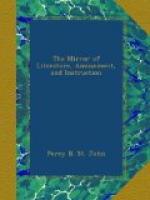The worst effect of “the scholar’s melancholy,” is when it leads a man, from a distrust of himself, to seek for low company, or to forget it by matching below himself. Porson, from not liking the restraints, or not possessing the exterior recommendations of good society, addicted himself to the lowest indulgences, spent his days and nights in cider-cellars and pot-houses, cared not with whom or where he was, so that he had somebody to talk to and something to drink, “from humble porter to imperial tokay,” (a liquid, according to his own pun,) and fell a martyr, in all likelihood, to what in the first instance was pure mauvaise honte. Nothing could overcome this propensity to low society and sotting, but the having something to do, which required his whole attention and faculties; and then he shut himself up for weeks together in his chambers, or at the university, to collate old manuscripts, or edite a Greek tragedy, or expose a grave pedant, without seeing a single boon companion, or touching a glass of wine. I saw him once at the London Institution with a large patch of coarse brown paper on his nose, the skirts of his rusty black coat hung with cob-webs, and talking in a tone of suavity approaching to condescension to one of the managers. It is a pity that men should so lose themselves from a certain awkwardness and rusticity at the outset. But did not Sheridan make the same melancholy ending, and run the same fatal career, though in a higher and more brilliant circle? He did; and though not from exactly the same cause, (for no one could accuse Sheridan’s purple nose and flashing eye of a bashfulness—“modest as morning when she coldly eyes the youthful Phoebus!”) yet it was perhaps from one nearly allied to it, namely, the want of that noble independence and confidence in its own resources which should distinguish genius, and the dangerous ambition to get sponsors and vouchers for it in persons of rank and fashion. The affectation of the society of lords is as mean and low-minded as the love of that of cobblers and tapsters. It is that cobblers and tapsters may admire, that we wish to be seen in the company of their betters.
New Monthly Magazine
* * * * *
THE “STAY-AT-HOME.”
I’ll never dwell among the Caffres;
I’ll never willing cross
the Line,
Where Neptune, ’mid the tarry laughers,
Dips broiling landsmen in
the brine.
I’ll never go to New South Wales,
Nor hunt for glory at the
Pole—
To feed the sharks, or catch the whales,
Or tempt a Lapland lady’s
soul.
I’ll never willing stir an ell
Beyond old England’s
chalky border,
To steal or smuggle, buy or sell,
To drink cheap wine, or beg
an Order.
Let those do so who long for claret,
Let those, who’d kiss
a Frenchman’s—toes;
I’ll not drink vinegar, nor Star
it,
For any he that wears a nose.
I’ll not go lounge out life in Calais,
To dine at half a franc a
head;
To hut like rats in lanes and alleys—
To eat an exile’s gritty
bread.




